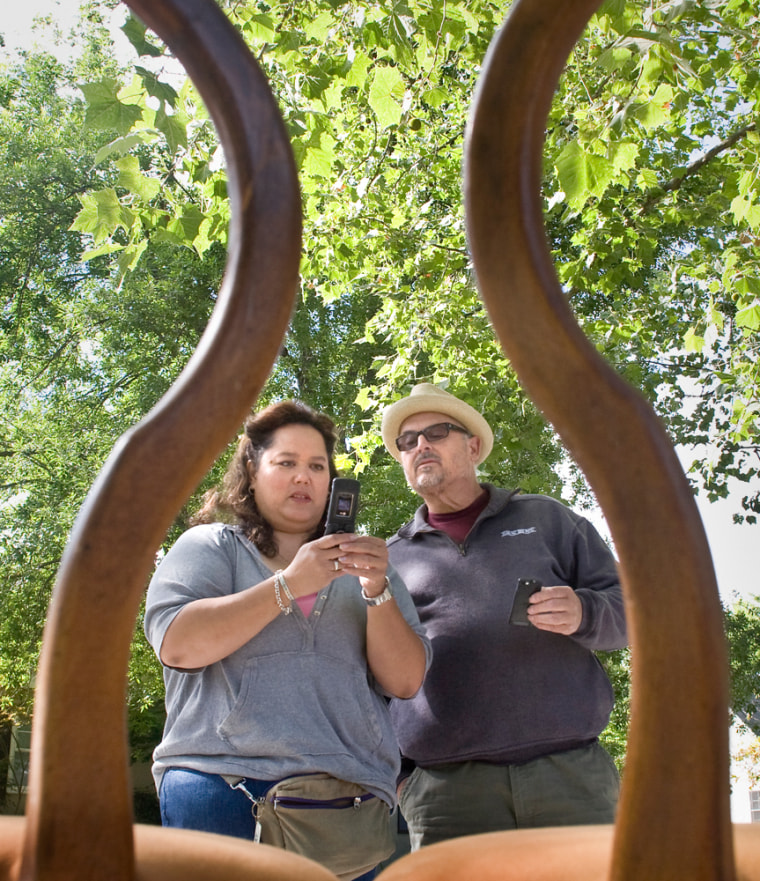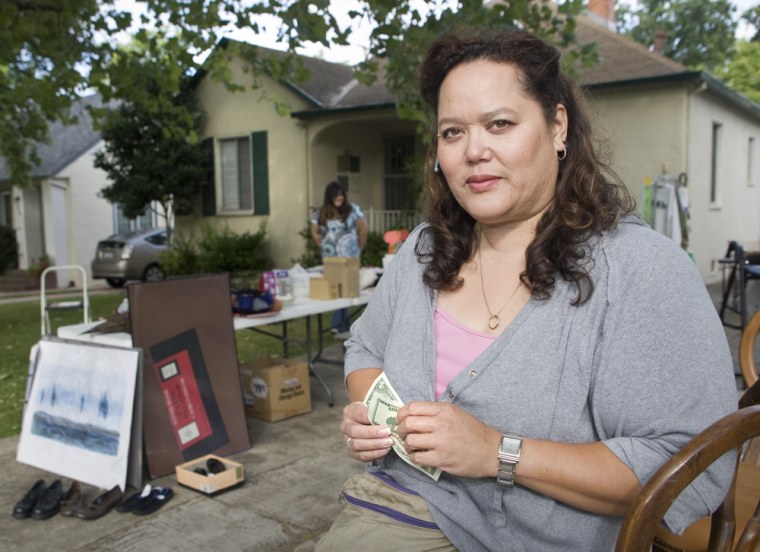Mary Uhazi has more than $60,000 in credit card debt and, by her own account, “nothing to show for it.”
“You have some clothes, you have some dinner, you have a handbag, you have whatever, but it’s not $11,000 worth or it’s not $60,000 worth,” Uhazi said.
Uhazi is drowning in a sea of debt. And, like millions of other Americans, it is a debt load that she built up slowly over more than two decades of easy credit that made it all too simple to spend. Now she worries she won’t be able to pay it off because of the recession, which has led to a reduction in her salary and an increase in her credit card bills.
“It may come to a point where I do end up filing for bankruptcy,” she said.
That’s a situation Uhazi, 43, never imagined she would be in when she signed up for her one of her first credit cards — a Chevron gas card — around 1988.
At the time, she figured the card would be a convenience, so she wouldn’t have to stop at the bank to get cash before buying gas. In the beginning she paid it off every month.
But it didn’t take long before Uhazi’s wallet started to fill up with other cards, including a bank card and some department store cards. Once she had the credit cards, she said, it was easy to go from paying them off at the end of the month to maintaining a balance and figuring she would get to it eventually.
“It was just a gradual thing,” said Uhazi, who lives in Sacramento, Calif., and works for the state.
Piling it on the credit card
As the years went by, there seemed to be more and more reasons to use the card. If it was Christmas, there were presents to buy. If it was her birthday, she figured she could splurge on a short trip to San Francisco for a baseball game. If she went out to dinner with friends, she reasoned that she should treat everyone because she made the higher salary, so she whipped out her card again.
“It was just easy to put something on the card,” she said.
Her debt built up slowly, and without any truly major purchases. There were a few vacations here and there, and new clothes she had to buy after taking a job that required nicer attire. Everything from movie tickets to gift cards for friends to an $800 car repair went on the card. She went to Home Depot one day to buy flowers and potting soil, and ended up with a store-branded card that still carries a small balance.
If someone asked her if she wanted to open a store credit card, she said she’d sometimes do it in part because, as a former retail worker, she knew the salesperson would get a commission. Sometimes, it was because of the free gift or one-time discount.
As the years went by and she kept on charging, the limits on her cards kept going up, and the offers for new cards kept coming in.
“The more money I earned, it seemed like the more money I spent, and the higher my credit was extended,” she said.
Soon, her wallet was stuffed with 13 credit cards, from stores such as Costco, Target, Nordstrom, Macy’s and Sam’s Club plus financial institutions. Still, Uhazi said she didn’t often worry about her credit card debt, reasoning that she paid at least the minimum balance on all her cards. She said she only made a single late payment, and that was an oversight.
“I was able to make the payments, and as long as I was able to make the payments I was OK,” she said.
Uhazi rarely talked about her credit card debt with her friends or family until recently. Her own mother, who has since passed away, went through a bankruptcy when Uhazi was in high school. But, Uhazi said, “I didn’t learn from her.”
There were times, though, when she buckled down and paid off more than was required. In 2003 she received a $20,000 inheritance and used $15,000 of it to pay off credit card debt. But soon the balances started to creep up again.
Then this year Uhazi learned she was going to have to start taking unpaid furlough days, resulting in a nearly 10 percent drop in her salary, because of California’s budget crunch. Around the same time, she started noticing that her minimum card payments were increasing as lenders raised her interest rates and reduced her credit limits.
One morning this spring, she sat down and tallied her debt. The total: $62,597.
“It’s awful, just looking at it,” she said.
If the debt was startling, so was the amount she was paying to service it. That month, Uhazi realized, she would have to pay $1,932 just in minimum credit card payments, about two-thirds of her reduced take-home pay of $3,018. After rent and other fixed expenses, she figured she’d have just $127 left for gas, food and other incidentals.
Perhaps the worst part was trying to figure out how her debt had reached that point.
“It was like, what do I have to show for this, really?” she said. “If I have anything, it’s just material stuff, or it’s a waistline from, you know, going out to lunch or something.”
Uhazi has stopped using most of her cards, except for the gas card and one that she uses for reimbursable work-related expenses, and that doesn’t carry a balance.

She also has cut back her spending habits, including eating out less and not buying anything but necessities. On a recent holiday weekend, her plans including using some free baseball tickets and “splurging” on the $1 specials on hot dogs and ice cream at the local River Cats minor league ballpark. She said she doesn't miss shopping.
“I’m not tempted,” she said. “I know what I’m trying to do.”
She also began calling her credit card companies, to see if there was a way to reduce the highest interest rates or make her payments more manageable. The results were mixed.
One major retailer agreed to drop her interest rate from 20.24 percent to 9.99 percent for up to a year, but she had to agree not to use the card anymore. Another agreed to drop her interest rate from 22.9 percent to 18.9 percent. But a third retailer said it could not go below her current rate of 23.99 percent.
The bank that issued a credit card with Uhazi’s highest balance, about $13,000, said it could drop the interest rate on about $10,000 in credit card debt from 27.99 percent to 24.99 percent. But if it did that, the rate she pays on her cash advance balance of about $3,500 would go up, from 28.99 percent to 30.99 percent.
Meanwhile, she continues to get more credit card offers in the mail.
Uncertain future
Despite her efforts, Uhazi’s financial situation remains precarious. The furlough days and reduced salary are expected to last until June 2010, and she worries that her salary could be cut another 5 percent or more as the state grapples with severe budget woes.
She’s thought about trying to get a second job in the evenings, but such jobs are hard to get these days, and she worries about taking a position away from someone else who has no other means of income. Recently, she held a garage sale, raising $183.65 — almost enough to make up for the drop in pay she had that month because of the furlough.
Uhazi has depleted most of her savings tryingto make up for the drop in salary. Even as she works to pay down her debt, she worries that she’ll have to start using the cards again just to pay for necessities, like food. Financial goals she once dreamed of, like buying her own home, have been put off indefinitely.
At times, she frets that her only option will be to file for bankruptcy, especially if her salary is cut further.
For now, though, Uhazi said she is hoping to avoid a bankruptcy filing. The panic she felt when she first realized how deeply in debt she was has subsided, she said, as she’s talked with more people and learned how many others have grappled with similar problems.
She said it’s also been good to finally tally up the debt and talk to the credit card companies about her situation.
“It’s so stressful, but I feel a lot better about it,” she said. “I’m trying to fix it.”
